Africa: A Journey into Music • 2018 • 3 episodes • 2h:54m
Documentary series exploring the musical traditions of African countries and their influence on popular music.
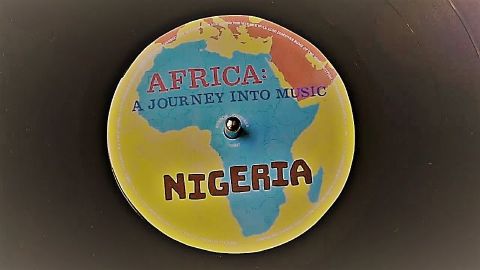
DJ and broadcaster Rita Ray travels to Nigeria, home of some of the most influential African music of the last 60 years. The country's extraordinary polyrhythms have powered highlife, funk and Afrobeat for decades, and can still be heard in modern pop music. Travelling to Lagos and beyond, Rita traces the importance of rhythm in Nigeria's music and discovers the many different musical styles it has created, from Yoruba juju music, to acoustic singer-songwriters and world-class pop.
1 • 2018 • Music
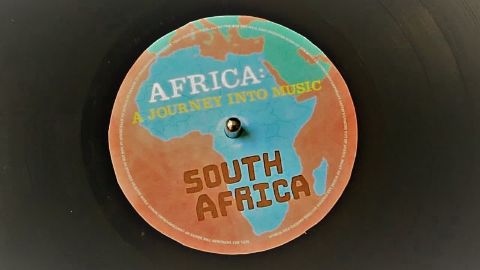
DJ and broadcaster Rita Ray travels to South Africa, home to distinctive vocal harmonies that have travelled all over the world. Visiting Johannesburg, Durban and Cape Town, she discovers the extraordinary songs and harmonies that have given this country a voice abroad. They have often carried messages about inequality and injustice at home, resulting in beautiful music with a real sense of purpose. South Africa is a diverse nation, and each tribal group has its own musical traditions.
2 • 2018 • Music
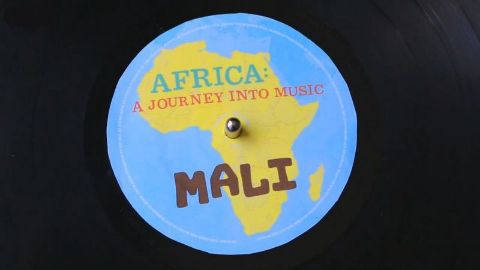
DJ and broadcaster Rita Ray travels to Mali in West Africa, home to a deep musical culture and ancient instruments that are the hallmark of their sound. Mali has produced more Grammy-winning artists than any other African country, and this well of talent has drawn in artists and producers from around the world to collaborate with the local musicians. Whilst the country has been rocked by Islamist insurgency, leading to a ban on music in some areas, Rita finds out how a traditional way of life and rich musical culture have endured.
3 • 2018 • Music
- International edition
- Australia edition
- Europe edition
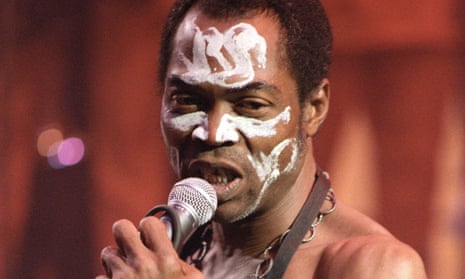

Friday’s best TV: Africa – A Journey Into Music; The Bridge
A new series kicks off with an examination of Nigeria’s musical heritage, scary clowns run amok in the Scandi noir and there’s yet another awful mix up in Friday Night Dinner
Africa: A Journey Into Music
10pm, BBC Four
There could be no better guide for this series than the broadcaster DJ Rita Ray, who travels to South Africa, Mali and, in this opening episode, Nigeria to look at Africa’s great musical traditions. She knows the music; it’s in her bones. Tonight, Ray examines the legacy of Fela Kuti and the properly regal King Sunny Adé, while demonstrating how the irresistible polyrhythms Nigeria has generated have, over the decades, fed into unique musical styles including highlife, jùjú and funk. David Stubbs
9pm, BBC Two
Coulrophobes may wish to avoid this week’s instalment of the Nordic noir, as scary clowns run riot around Malmö’s hospital wards and detectives Saga and Henrik find themselves confronting various forms of parental responsibility. Everyone else is in for a typically twist-filled hour of television. Ellen E Jones
Tracey Breaks the News
9.30pm, BBC One
A new series of the sketch show lands, with Tracey Ullman mercilessly skewering Theresa May, Nicola Sturgeon and, in a new turn, environment secretary Michael Gove. Also in line for a roasting are Jeremy Corbyn, Angela Merkel and Rupert Murdoch. Ben Miller also makes an appearance. Ben Arnold
Friday Night Dinner
10pm, Channel 4
Another Shabbat dinner deteriorates into chaos in the most unlikely circumstances. Tonight, the mayhem is down to Martin’s microscope obsession (“This hair is from my armpit”), visits by the police, Adam being asked to play the violin and an imaginary rectum issue. Laugh-out-loud funny. Jonathan Wright
High & Dry
10.30pm, Channel 4
Marc Wootton’s decent desert island comedy – which pitches its improvised palm frond shelter somewhere between Lord of the Flies and Benidorm – continues. In tonight’s episode, flight attendant Brett (Wootton) and Douglas depart for the other island – and make an interesting discovery. John Robinson
Front Row Late
11.05pm, BBC Two
To the Hay festival – one of the major dates on the literary festival scene along with Port Eliot. Mary Beard talks to the righteous Rose McGowan, whose memoir/manifesto Brave had Hollywood taking a long, hard look at itself. Also appearing are columnist Laurie Penny and acclaimed Home Fire novelist Kamila Shamsie. Ali Catterall
Deja Vu (9pm, Sony Movie Channel)
Tony Scott’s frenetically entertaining sci-fi has Denzel Washington as a government agent who zips back in time to prevent a terrorist bombing of a ferry in which hundreds die: he aims to nail the extreme patriot responsible (Jim Caviezel) and hook up with a beautiful victim. Paul Howlett
Tennis: The French Open (9.30am, Eurosport 1) The third round of the singles gets underway at Roland Garros.
Test Cricket: England v Pakistan (10am, Sky Sports Main Event) The second and final Test of the series begins at Headingley.
Golf: The Memorial Tournament (7.30pm, Sky Sports Main Event) The second day at the Muirfield Village Country Club in Dublin, Ohio.
Comments (…)
Most viewed.
Search form

Africa: A Journey Into Music, BBC Four review - too little, too late? | reviews, news & interviews
Africa: a journey into music, bbc four review - too little, too late, all around nigerian music in just one hour.
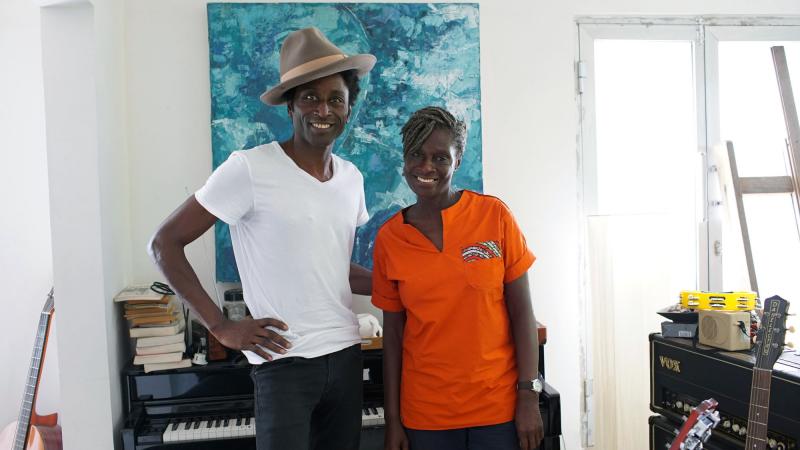
BBC Four is the TV music equivalent of those oldsters music mags like Q and Mojo . Have there been five, or is it six, documentaries about Queen on the channel? You can sense the commissioners feeling with this new series they have now done their bit for African music for the next few years. In general, the BBC, unlike counterparts in places like France, have been ridiculously Anglocentric in their music coverage – like having a cooking channel that leaves out Indian, Chinese and Japanese food.
The main difficulty, in the first episode, is that the idea of “doing” Nigerian music in an hour is in many ways absurd. Can you imagine an African documentary maker “doing” English music in an hour? What to cover? Music Hall, the Beatles, metal, grime, Britten with three minutes on each.
The presenter Rita Ray comes off well on screen, at all times a real enthusiast. Everything is “amazing” if not “bonkers". She has been an African music aficionado for decades, but doesn't really get to show off her knowledge and real insights into Nigerian music.
The result is at times a bit Auntyish and old fashioned – somewhat earnest discussions of the nature of polyrhythms included. There are several documentaries jammed into one hour. The most famous Nigerian musician of them all is Fela Kuti, who gets better known each passing year, with a recent musical to his name and Beyoncé doing covers. Although not big in Mojo/BBC Four world, his scorching “Zombie” from 1976 (the Zombies were the police and military) was a song that provoked riots and fierce retaliation from the authorities. It was, we can definitively say by now, at least as influential and revolutionary a track as “Anarchy In The UK” of the same year.
There are some great moments - including the strange Yoruba twins communing with the ancestors, the dancing white ibexes, but not enough
There are brief excerpts of what probably was a great interview with Fela's son Femi and some nice snippets of archive. But you suspect if Netflix did Fela they would probably do one of their five-hour documentary series as they have done of Rajneesh/Osho ( Wild Wild Country ) and Bobby Kennedy.
Meanwhile the upstart internet TV music channels like Vice or Boiler Room would more likely have focussed intently on one of the new Nigerian Afrobeats (with an s) pop stars who are sweeping the world. Rita Ray seems a bit uninterested in the likes of Davido, but does get a good interview with one of the band Bantu who thinks this new Nigerian music is thrilling because it places the music for the first time on a par with American music (with its collaborations with Kanye West and Diplo and the like) and says the “world music” route is at last not the only way to achieve international recognition.
Within Afribeats itself there are some great stories – like the relationship between D’Banj and Don Jazzy, for example – a great hit writing partnership and friendship that was torn asunder when D’Banj "the koko-master" relocated to the US. A tragicomedy and a soap opera. That would be a documentary worth seeing.
Rita Ray gets on well with, and charms most of the older artists like hi-life star Victor Owaifo (filmed in his eccentric mansion and museum – worth watching just for that) and she no doubt has a warm pre-existing relationship with some of the stars like Sunny Adé and Keziah Jones. The one Afrobeats star she coaxes a fascinating interview with is Tiwa Savage, and the strongest parts of the documentary are when she is chatting to female stars like her and singer-songwriter Nneka. Women musicians in Nigeria would be a good subject for Ray to make more films on.
As it is, this skates along the surface without enough sense of the epic, the transcendental, the power and sheer sexiness of the music or the struggles of the people, and is unlikely to really please world music or Afrobeats fans. There are some great moments, including the strange Yoruba twins communing with the ancestors, the dancing white ibexes, and the swagger of a motorcycling cop, but not enough.Thankful for small mercies? Not exactly.
- More TV reviews on theartsdesk
@peterculshaw
Related Articles
- Fela Kuti, The One Who Emanated Greatness
- Fela!, National Theatre
- Imagine: Freddie Mercury - The Great Pretender, BBC One
- Welcome to Lagos, BBC Two
- Dele Sosimi Afrobeat Orchestra, Purcell Room
Explore topics
- African music
- documentary
- history of music
- world music
Share this article
As an old capetonian my view, add comment.
More information about text formats
Filtered HTML
- Web page addresses and e-mail addresses turn into links automatically.
Get a weekly digest of our critical highlights in your inbox each Thursday!
Simply enter your email address in the box below
View previous newsletters
Doormat Navigation
- See our complete archive
- privacy and cookies
Africa: A Journey into Music
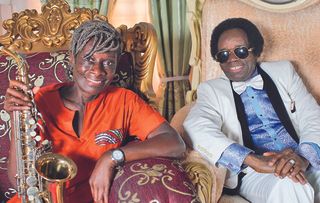
Rita Ray traces Africa’s musical influence on the West
Rita Ray – presenter, DJ and singer from 1980s rhythm and blues revival band Darts – explores the enduring influence of African music on popular culture in this new three-part series.
She begins in Nigeria, where Rita outlines a brief history of the ‘source of the sound’ – the drumbeat ubiquitous throughout Africa.
Rita then heads off to meet pop royalty King Sunny Adé, who became the first Nigerian to have success in the West with his 1982 album Juju Music.
Rita is clearly having a blast as she meets her musical heroes, including Victor Uwaifo of Guitar Boy fame and Femi, the son of high-life legend Fela Kuti, and his musical protégés who have blazed a trail in afrobeat, afrosoul and funk. An hour of joyful rhythms you can’t help swaying along to.
Get the What to Watch Newsletter
The latest updates, reviews and unmissable series to watch and more!
How to watch the 2024 Boston Marathon online or on TV
'It's like Buck Rogers in the 25th Century, or the reverse of Life on Mars,' teases Mammoth star Mike Bubbins
The Young and the Restless’ may strike Emmy's gold thanks to these two show vets
Most Popular
- 2 'It's like Buck Rogers in the 25th Century, or the reverse of Life on Mars,' teases Mammoth star Mike Bubbins
- 3 The Young and the Restless’ may strike Emmy's gold thanks to these two show vets
- 4 How to watch Midsomer Murders in 2024 online or on TV
- 5 Camden: musicians, premise and everything we know about Dua Lipa's documentary series
- Cast & crew
Africa: A Journey into Music
Add a plot in your language
- All cast & crew
- Production, box office & more at IMDbPro
User reviews
- June 1, 2018 (United Kingdom)
- United Kingdom
- Sundog Productions
- See more company credits at IMDbPro
Technical specs
Related news, contribute to this page.
- IMDb Answers: Help fill gaps in our data
- Learn more about contributing
More to explore

Recently viewed

- Web Channels
Africa: A Journey into Music

Rita Ray travels to Mali, Nigeria and South Africa in search of the timeless ancient rhythms, instruments and harmonies that underpin the popular music from these three fascinating countries. She discovers how much of the music we listen to in the west is rooted in the enduring influence of the musical traditions from the African continent.

Official site: www.bbc.co.uk
(waiting for more votes)

Previous Episode
Episode 1x03; jun 15, 2018.
In the last of the series Rita Ray travels to Mali in West Africa, home to a deep musical culture and ancient instruments that are the hallmark of Mali's sound, plus a well of talent that has drawn in artists and producers from around the world to co …
Previous Episodes
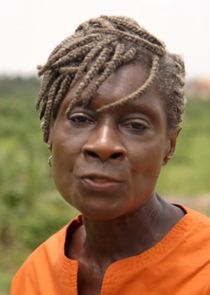
Africa: A Journey into Music Part 3 Mali
From docuwiki, [ edit ] general information.
Arts Documentary hosted by Rita Ray , published by BBC in 2018 - English narration
[ edit ] Cover

[ edit ] Information
Africa: A Journey into Music Part 3 Mali DJ and broadcaster Rita Ray travels to Mali in West Africa, home to a deep musical culture and ancient instruments that are the hallmark of their sound. Mali has produced more Grammy-winning artists than any other African country, and this well of talent has drawn in artists and producers from around the world to collaborate with the local musicians. Whilst the country has been rocked by Islamist insurgency, leading to a ban on music in some areas, Rita finds out how a traditional way of life and rich musical culture have endured.
[ edit ] Screenshots
[ edit ] technical specs.
- Video Codec: x264 CABAC [email protected]
- Video: Bitrate: CRF- 21 (~3215 kb/s)
- Video Aspect Ratio: 1280 x 720
- Video Resolution: 1.778 (16:9
- Audio Codec: MPEG-4 AAC LC
- Audio: English
- Audio Bitrate: 165 kb/s VBR 48000Hz
- Audio Channels: Stereo 2
- Run-Time: 59 mins
- Framerate: 25. Fps
- Number of Parts: 1
- Container Mp4
- Part Size: 1.39 GB
- Source: HDTV
- Encoded by: Harry65
Release Notes
Merged English Subtitles
[ edit ] Links
[ edit ] further information.
- www.bbc.co.uk
[ edit ] Release Post
- MVGroup.org (torrent)
[ edit ] Related Documentaries
- Mali, Bosnia and China
- Y Africa: The New African Art Scene Series 1
- The Queen of Africa: The Miriam Makeba Story
- African Renaissance: When Art Meets Power Series 1
- Angelique Kidjo (BBC)
- Family Goldmine
- Dolce Vita Africana
- Youssou N'Dour
- Africa: A Journey into Music Part 1 Nigeria
- Africa: A Journey into Music Part 2 South Africa

[ edit ] ed2k Links
BBC.Africa.A.Journey.into.Music.Series.1.Part.3.Mali.720P.HDTV.x264.AAC.MVGroup.org.mp4 (1425.60 Mb) Subtitles : [eng]
Retrieve Share Stats
Categories : Arts | Rita Ray | BBC | 2018 | English | Name Language > English Name Publisher > BBC Rita Ray Subject > Arts Year > 2018
Personal tools
- Random Page
- Latest Additions
- Recent Changes
- Contribute/Register
- Add new page
- Missing Docus
- Crosspost this page
- Rename this page
- Broadcasting Series
- What links here
- Related changes
- Upload file
- Special pages
- Printable version
- Permanent link

- This page was last modified 00:38, 28 April 2021.
- This page has been accessed 3,401 times.
- Privacy policy
- About DocuWiki
- Disclaimers
Accessibility links
- Skip to content
- Accessibility Help
Africa: A Journey Into Music - Nigeria

Rita Ray - DJ, broadcaster and singer from 70s & 80s Rhythm and Blues revival band, Darts - travels to Mali, Nigeria and South Africa in search of the timeless ancient rhythms, instruments and harmonies that underpin the popular music from these three fascinating countries.
She discovers how much of the music we listen to in the west is rooted in the enduring influence of the musical traditions from the African continent.
In the first episode of the series Rita Ray travels to Nigeria, home of some of the most influential African music of the last 60 years. Nigeria's extraordinary poly-rhythms have powered the evolution of its popular music from high-life to Fuji to Afrobeat and now, Afrobeats, the sound which is sweeping the continent and the world. She finds out about the key figures in the development of modern Nigerian music, including creator of a whole genre of music, Fela Kuti, a giant from the 70's who's legacy is still embraced by the new wave of the Nigerian artists.
Travelling to Lagos and beyond, Rita traces the importance of rhythm in Nigeria's music and discovers the many different musical styles it has created, from Yoruba juju music, to funktastic acoustic singer-songwriters and purveyors of world class pop.
Musician King Sunny Adé, one of the first superstars of modern world music, tells Rita about the acclaim he received in Europe following the global release of his record, Juju Music, in the early 80s.
Contributors include the biggest name in Afrobeats, vocalist and producer Davido; MOBO Award winning singer and actress Nneka who was sampled by Rita Ora for ‘RIP’ (pictured with Rita above); Orlando Julius Ekemode who created his own influential Afrosoul sound during the mid-60s; Blufunk musician Keziah Jones; Femi Kuti - eldest son of afrobeat pioneer Fela Kuti and MTV Africa Music Award winner Tiwa Savage.
Publicity contact: HD2
Fuji music in Nigeria: new documentary shines light on a popular African culture
Professor of History and African and African Diaspora Studies, Florida International University
Disclosure statement
Saheed Aderinto does not work for, consult, own shares in or receive funding from any company or organisation that would benefit from this article, and has disclosed no relevant affiliations beyond their academic appointment.
Florida International University provides funding as a member of The Conversation US.
View all partners
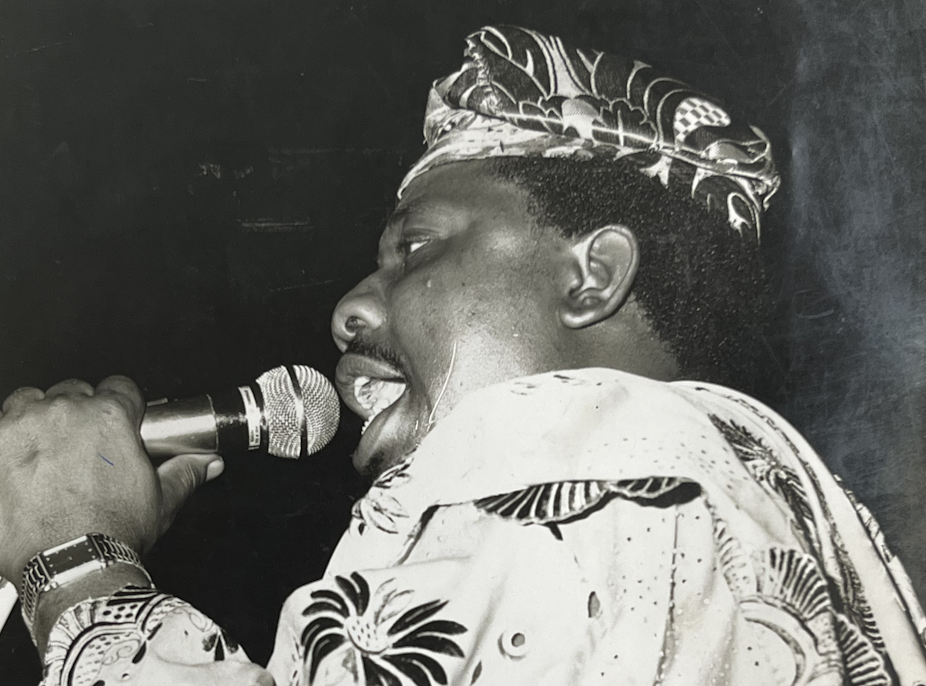
Nigerian singer Síkírù Àyìndé Barrister (1948-2010) pioneered fújì , a Yorùbá genre of popular dance music. In February 2024, historian Saheed Aderinto’s documentary on the musician’s life and times premiered . The Conversation Africa’s Wale Fatade asked Aderinto about the film and the music it brings to our attention.
What is fújì music?
Fújì fuses Islamic philosophy and wordsmithing with Yoruba poetry and meaning-making to create sound, idioms and recreational habits. It does this across social classes, from the wealthy in the corridors of political power to the poor at the fringe. Its messages, politics, performance styles, space and sophistication reflect a wide range of realities.
However, fújì did not begin as a secular and commercial sound. Its musical ancestor, wéré , was a seasonal Islamic performance during Ramadan. Wéré’s origin dates to the 19th century or earlier when Islam established firm roots among the Yoruba. The Yoruba are one of the numerous ethnic groups in Nigeria.
From the early 1970s, Ayinde Barrister began to expand the domain of wéré’s performance. He turned it into an all-year-round commercial secular music drawing from established secular forms. By the mid-1970s, fújì emerged as a distinct genre through his pioneering efforts. He combined numerous elements of existing music, such as sakara , apala , juju and Afrobeat , to create a hybrid sound that also borrowed from Yoruba aesthetics of praise singing.
By the mid-1980s, fújì was a staple in the Nigerian soundscape. As the 20th century eclipsed, it was one of the most dominant popular music styles across the African diaspora.
Today, fújì exhibits all the conventional elements of global entertainment music. Its beat-making, computer-based production technology, new electronic and digital circulations, and eclectic performativity all align with similar global forms such as Afrobeats. And fújì is not immune to common criticisms of popular music : sexualising women, portraying unrealistic notions of socio-economic mobility, and promoting obnoxious ideals of self-making.
Read more: 100 years of pop music in Nigeria: what shaped four eras
How does it live on in Nigeria today?
Today, fújì is the most dominant of the Yoruba musical traditions. A large number of professional singers self-identify as fújì artists and perform the genre in its identifiable form. It has overtaken all other Yoruba forms and even influenced contemporary Afrobeats. For example, Afrobeats artist Olamide’s song Omo Anifowose is deeply influenced by K1 de Ultimate’s song of the same name.
From big parties in African diaspora communities in Europe and North America to obscure events in the inner city of Ibadan, fújì is a central musical form.
Musicians range from the sophistication of Kollington Ayinla , K1 de Ultimate and Sefiu Alao Adekunle (Baba Oko), among others, to aspiring artists like Muta Jero of Bodija in Ibadan. Fújì draws fans and practitioners not only because of its flexible playing styles, but also because the sound, message and performance connect with people’s everyday realities.
Fújì is how people remember their family stories.
The global audience of the documentary can easily connect with issues that cross cultures, such as the religious origins of the music, the grass-to-grace stories of superstars, love, gender and erotic passion. Similarly, trials, triumphs and tribulations, forgiveness and reconciliation, public politics and protest art, creativity, global travels, fandom and stardom, self-making and identity construction, sickness, death and immortality. It is fújì’s transculturality, which doesn’t lose sight of specific historical and cultural contexts, that fascinates me.
Why did you choose the story of Sikiru Ayinde Barrister?
He pioneered the genre. It’s logical for the first episode of The Fuji Documentary to focus on him. He dominated and defined fújì sound and performance. Even his politics was the most sophisticated. This changed from preaching against bad democratic leadership in 1983, to supporting the military incursion into Nigerian politics in 1984, to protesting against military dictatorship in the 1990s, and extolling democratic principles in the first decade of the 21st century.
His albums such as Nigeria (1983); Military (1984); Current Affairs (1989); The Truth (1994); Precaution (1995); Adieu MKO Abiola (1998); and Democracy (1999) combine all the elements of political theorisations that we find in some of the best works on African politics .
Unlike other musicians who mostly commented on public politics, Ayinde Barrister turned fújì into a political ideology. He did this by creatively tapping into indigenous perspectives on politics to speak to the 20th century crisis of political leadership in Nigeria.
What do you want viewers to take from the documentary?
Fújì is more than sound. It’s a way of life for millions of Yoruba people. It’s how they see the world around them.
The first episode preserves the legacies of Barrister through the medium of a film. It connects the public with university-level research or allows academic research to serve public interest. It creates knowledge in new ways and shapes how people remember the past. The Fújì Documentary takes the name of fújì into academic domains where it didn’t exist until now.
To shoot the documentary in public libraries, cultural centres, galleries, art theatres, museums and facilities on university campuses, I wrote formal letters and lobbied to convince people that the story is a collective story that everyone should own. Allowing people to own a narrative doesn’t necessarily mean they are familiar with the narrative — it’s connecting that narrative to what they are familiar with.
When I look at the array of people involved in this first episode, I come to realise that what makes a history public history is not just telling a story that the public can relate to in an accessible manner, but also getting the public to be part of the creation and to own the process.
And the public in this sense is not just one public, but multiple publics who don’t necessarily share the same perspectives about anything. Bringing these multiple publics together to create a single public for the documentary is an unending process.
- Yoruba culture
- Nigeria Music

Faculty of Law - Academic Appointment Opportunities

Operations Manager

Senior Education Technologist

Audience Development Coordinator (fixed-term maternity cover)

Lecturer (Hindi-Urdu)
"Opportunity Trap: Unveiling the Occult in the Music Industry" -Naava Grey | Sami-K Lyfe Be
- Society & Culture
In this episode, we delve into the captivating journey of Naava Grey, the Ugandan musical sensation .From humble beginnings to signing with SONY Music Africa,Naava reveals how her encounter with Mesach Semakula became a pivotal moment, igniting her passion for the Luganda language in both singing and songwriting. She also recounts her serendipitous meeting and working with prolific producer Michael "Fingers" Mugisha and the thrilling tale of her first demo being smuggled out of Studio onto the radio airwaves . Explore the profound impact of her music on individuals and communities, alongside insights into the challenges she's faced, including revelations about covert occult operations within the entertainment industry. Follow us •YouTube 📺 https://www.youtube.com/@Lyfebepod Support our journey financially to bring you more inspirational stories: •Cash App: https://cash.app/$Lyfebe4 •Mobile Money: +256 772 685 821 / +256 702 685 821 --- Send in a voice message: https://podcasters.spotify.com/pod/show/lyfebe/message
- Episode Website
- More Episodes
- Sami-K (Samuel Kiggundu)
Top Podcasts In Society & Culture
Receive great stories from around the world directly in your inbox.
Stay up to date about Global Voices and our mission. See our Privacy Policy for details. Newsletter powered by Mailchimp ( Privacy Policy and Terms ).
- bahasa Indonesia
See all those languages up there? We translate Global Voices stories to make the world's citizen media available to everyone.
- What Is Global Voices?
- Partner with Global Voices
- Translation Services
- Arts & Culture
- Breaking News
- Citizen Media
- Development
- Digital Activism
- Economics & Business
- Environment
- Ethnicity & Race
- Freedom of Speech
- Human Rights
- Humanitarian Response
- International Relations
- Media & Journalism
- Migration & Immigration
- Photography
- War & Conflict
- Women & Gender
A journey into African music · April, 2022
- September 2023 2 posts
- April 2023 1 post
- February 2023 3 posts
- June 2022 8 posts
- May 2022 4 posts
- April 2022 1 post
- March 2022 5 posts
- February 2022 1 post
- September 2021 1 post

Feel the music! Image by Jan Moons, Africa Film Festival, April 9, 2016. ( CC BY-NC-ND 2.0 )
African music, with its distinctive emphasis on polyrhythm and beats flowing from percussive instruments, was long treated as subordinate in the international music arena. Music from the continent contrasted the organized sound, instrumentation, and melody which characterized Western music. The distinctive texture in African music is largely due to the cultures that produce the music. Within traditional African societies, music is not to be consumed alone, but is always accompanied by dancing. For within the continent's vast and numerous cultures, music, dance, and rites were all tied to the same cosmic significance — communal living, funerals, marriage celebrations, and festivals.
However, this has changed considerably. African musicians have over the decades persevered in their craft. In so doing, they have not only carried on the distinctive flavors of their forbearers but also expanded and built upon traditional sounds. As music has flowed from the continent to merge with song patterns from other parts of the world, African music and its cultural context has grown beyond the continent.
A journey into African Music is therefore a tribute to the generations of African musicians who influenced the contemporary generation of singers. This series is an acknowledgment of the arduous journey from obscurity to global appeal, acceptance, and significant contributions. In this series, Global Voices will peer into the past in order to understand and appreciate present-day musical phenomena in the continent and beyond.
In order to celebrate and explore these themes, this series will take a look at African music from four main angles. We will discuss the evolution of contemporary music genres, the sampling of music from African greats, the impact of African music on the global stage, and how music is consumed in the continent.
We will explore c ontemporary music genres that have gained popular validity within the continent and beyond. This will inevitably highlight the evolution of different genres of music within the continent , and include a chronological history of various popular African sounds. Global Voices’ Spotify features a variety of playlists that highlight these fusions and musical evolutions, such as this exploration of African Folk Fusion .
There is no question that there are some legendary musical giants in Africa — artists who influenced generations of artists around the world for decades to come. Musicians, all through history have relied on the music made by their predecessors to create new music. Sampling music is not isolated to the continent. Consequently, this series of posts will interrogate the influence of the older generation on contemporary artists and sounds.
Africa’s musical influence on global sounds will form the third aspect of posts from this series. This includes contemporary musicians who are going back to their roots by taking up traditional musical instruments or rhythms. The impact of incorporating traditional beats and instruments by African artists on b uilding bridges that connects the old to the younger generation. We will also engage contemporary African artists who have collaborated with artists from older generations with great success.
The fourth type of post in this series engages how is music consumed in the continent, in both offline and online spaces. This also includes the state of African music, in a world recovering from COVID-19, the impact of the pandemic on African artists or the music culture in different communities.
A journey in African music was conceptualized by Global Voices Sub-Saharan African editors, Nwachukwu Egbunike and Njeri Wangari. Both, being poets, perfectly understand the need to curate this cultural corpus for posterity. See our article series below.
Stories about A journey into African music from April, 2022

Protest music: young Nigerian musicians singing against social injustice
Nigerian young singers have continued in that revered tradition of singing against social injustice. The #EndSARS protest triggered their political consciousness, which hitherto, seemed to be experiencing a decline.
Global Voices is supported by the efforts of our volunteer contributors, foundations, donors and mission-related services. For more information please read our Fundraising Ethics Policy .
Special thanks to our many sponsors and funders .
Please support our important work:
-->